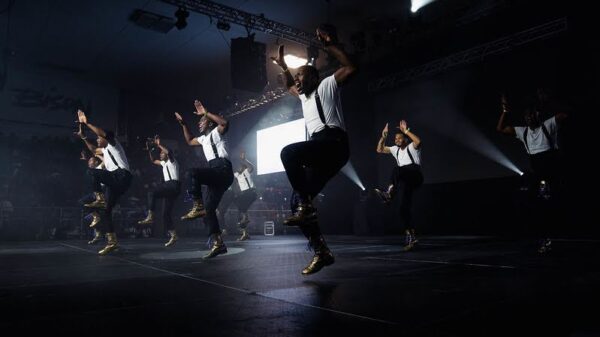“The High Ground,” written by Nathan Alan Davis, is a two-hander play that takes its viewers through the emotional aftershock of the Tulsa Race Massacre. Utilizing the dichotomy of preserving love while suffering with pain, the drama tells the story of a Black man living in the present-day, yet somehow, mentally traumatized by the horrific events that occurred on May 31, 1921, in Tulsa, Oklahoma.
A little over a century ago, the top of Standpipe Hill in the Greenwood District of Tulsa, Oklahoma overlooked the aftermath of a deadly race war. By the morning of June 1, 1921, smoke covered the city’s skyline as white rioters looted and burned down a once thriving, affluent African-American neighborhood, known as “Black Wall Street.” Every aspect of the neighborhood was destroyed. Homes, businesses, schools and churches were gone overnight.
Today, Standpipe Hill is home to Oklahoma State University’s Gateway tower. At 70 feet tall, The University’s orange logo stands out at the top of the tower and can be seen amidst the city’s skyline.
The Tulsa race massacre is one of the stories America has attempted to brush over. History books and newspapers across the country omitted the traumatic event for years. Megan Sandberg-Zakian, director of “The High Ground,” briefly spoke about the importance of amplifying tough stories such as the Tulsa race massacre.
“Looking at when you have a legacy of trauma and you’re negotiating with all the heaviness and the weight of that history and the ways that history wants to claim your attention especially when it’s a history that hasn’t been told, your attention is required in an even more intense way, because you’re focused not only on the terror that happened but on the fact that it’s being hidden,” Sandberg-Zakian said.
Encamped atop Standpipe Hill, beneath the Gateway tower, Soldier, played by Phillip James Brannon, refuses to leave the grounds as he is convinced his wife is coming back there to look for him. Dressed in army attire, Soldier is mentally trapped in 1921 and consistently recalls the events of the massacre. Victoria, his wife, played by Nehassaiu deGannes, makes multiple attempts to offer her love and presence to Soldier, but cannot bring her husband to accept the reality of Greenwood District in the present day.
Throughout “The High Ground,” Davis uses repetition and resilience to intentionally attack the tactic of burying this story. As Soldier repeats the date “May 31, 1921, 18 hours,” his pain is felt. His anger is understood. Soldier is rebellious, but he is not crazy.
Brief moments of laughter were felt in the theater during the occasional witty banters between Soldier and Victoria, but sounds of distress and headshakes were seen each time pain and emotion were delivered from the impactful performance. The theater’s reaction reassured that the overarching message was felt throughout the show.
Audience member Paige Muller reflected on what she took from the play.
“Seeing the parallels between then and now [was] really powerful because it seems like something that happened so long ago, it seems like something in our distant past, but showing those characters through that arch really shows that the passage of time hasn’t changed those circumstances, and that was heartbreaking,” Muller said.
“The High Ground,” is showing at Arena Stage at the Mead Center for American Theater through April 2.
Copy edited by Alana Matthew









